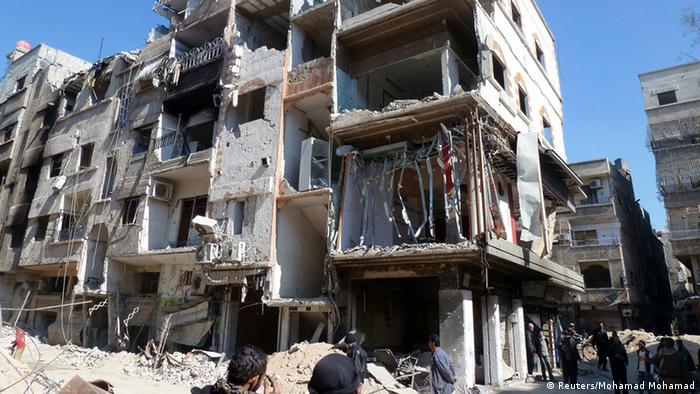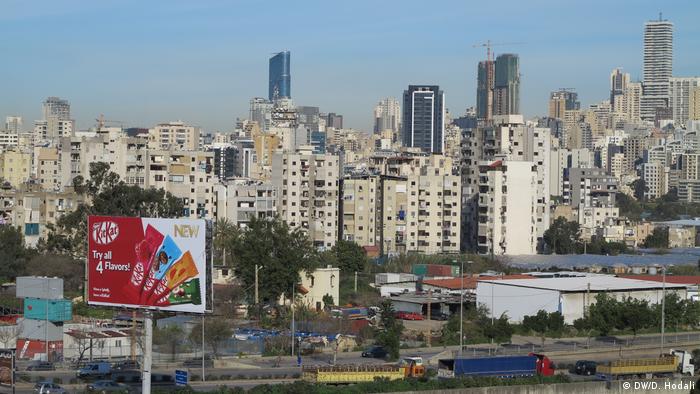In Lebanon, Syrian refugees can be deported under certain conditions. The Syrians Qaes Said do not want to return to his unsafe home. Diana Hodali has met him in Beirut.

The old, strong tree at the side entrance of the American University of Beirut is for many people a meeting place. Also, the Palestinian Syrians Qaes Said, where he meets well-Known. He is rooted like this tree in Beirut, but he says: “I live here now. I’ve made my peace with the fact that I’m not going to return to Syria.”
Today, the 32-Year-old has come to an event on the topic of “Syrian returnees” on-the-Issam-Fares-Institute to participate. The issue is in Lebanon virulent. Recently the Lebanese government has issued a decree: Syrians who arrived after April 2019 to the country, can be deported – no matter what danger may threaten you in your home. In addition, the Lebanese security authorities to bring the once-a-month voluntary returnees with a Bus to the Syrian border.
“The pressure in Lebanon is great. I don’t judge anyone, if he wants to go back. These are personal reasons,” says Qaes Said. For him, the don’t want to use his real name, that would not be an Option. Five years ago, he is legally in Lebanon, and his mother, and his sister, he was able to catch up a year later. Initially they lived in two rooms in the southern part of Beirut, but his sister is now in Canada. You got 2017 on a scholarship. “I take care of my mother,” says her brother: “she’s traumatized from what happened to us in Syria. To me, it was not the first few months in Lebanon well.”

Qaes Said does not want to leave Lebanon
Disappeared in Syria
Qaes Said grew up with his younger sister and his younger brother in a Palestinian refugee camp Jarmouk in the vicinity of Damascus. It went well, he reports. Although the war raged in many Parts of the country in 2012, he got his economic degree at the University of Damascus. But shortly thereafter, various war besieged parties Jarmouk: “The people have fled, as it was the first air attacks on the Camp. My family and I moved into a Hotel in Damascus.” But Said returned a little later back to the Camp. He then worked part time for a youth organization. And he wanted the young and old Backward support: “I’ll never forget the image of the women and children begging us to help you – we are your last hope.”
However, in 2013 this happened was, what is Said is often heard, but never thought to experience it for yourself: “The Syrian stormed the intelligence service of the Hotel where my family was. He stole every one of them – my parents and my siblings.” When he talks about it, lowers his voice: “My parents and my sister came a few weeks later. My brother, each track is missing since then.” He is silent and looks at the ground. “My mother wanted me to go to Beirut. She was afraid of me, because through my work in the Camp, no one knew whether I would be Next.” Even before he left in the spring of 2014, his father died. Qaes Said it was difficult, his mother and his sister behind. He was able to travel in Lebanon, although he was liable for military service. As a Student, he was allowed to postpone his service in the army.
Compulsory military service or jail?
But now five years have passed and the Syrian Regime does not know that he and his family are in Lebanon. “I don’t know what would happen if I went back, but it could be that I end up either in the army or in jail.”
Syria’s President Bashar al-Assad has stressed lately that refugees could return without fear of retaliation. However, the reports of various organizations, including Amnesty International and Sawa, a Syrian NGO in Beirut, speak a different language: Some returnees have been imprisoned, some tortured. Also, Syria’s feared chief of the air force intelligence, Jamil Hassan, speaks openly of wanted lists, on which members of the opposition and their families.
Qaes Said don’t want to take the risk in buying: “It is the same people are still in Power. In Syria this has changed, but politically nothing. Why should be the course of action and then another.” He is sure: “Assad wants to apolitical people in Syria. He wants Syrians who are neutral.” He no longer was. “As Palestinian refugees, my family and I have kept us earlier political discussions out of it.”
For a free life
Said no longer wants to live in political bondage. Because one thing is clear: as Long as Bashar al-Assad is in office, there will be no security. The Regime needs uncertainty, so no one revolts against the rulers.

The Syrians Quaes Said missed his home, but not back into the bondage
“I didn’t expect much from Lebanon. And I have had in relation to the other lucky,” he says. So he says that he has since his arrival, constant Jobs in non-governmental organizations and his mother and feed can. “I know many who want to go back, because you can’t pay everything, and the Syrians for all the problems in the country are made responsible.” The climate was often tense. The additional refugees has increased the pressure on the informal labour market, on the other, the affordable housing is scarce. Well over 950,000 Syrians are registered according to the UNHCR, in Lebanon, the number of unreported cases to be much higher.
Deportations to Syria
He knew now where he can identify himself as the Syrians and where is not, says Said: “some time ago, I have a history of my family is not so easy to tell. It would be very difficult. But I’ve learned to live with it.” Qaes Said wants to live in Dignity, he says. “I’m not the Only one, so something happened to you. It is a pain that many Syrians share.” Of course, he would think often to his homeland of Syria: “But I want to live in a place where I can travel, I can move, can be free. I never want to hear again that someone was abducted or tortured.”
He makes, therefore, to those Syrians who will be brought back from the Lebanese government forcibly. Eight Lebanese organizations have called on the government to put an end to this practice. Because Syrians have the right to request to Lebanon for asylum, the appeal of the Beirut organization, “The Legal Agenda”. “Even if it concerns for the time being, those who are since April in the country, it is not unreasonable that the Lebanon could widen the scope of the deportations,” says Qaes Said worried: “Here, you never know what’s coming next. Also I have to live with.”